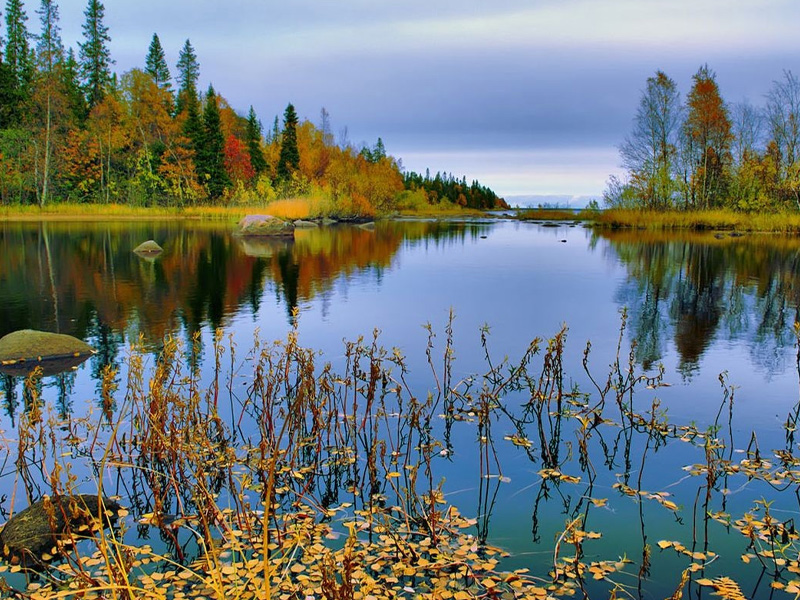Zarivar is a turquoise-colored lake located near the city of Marivan in Kurdistan Province, Iran. This lake is one of the largest freshwater lakes in Iran and even in the world. Zarivar Lake was listed as a natural heritage site in Iran in 2011. In this article from Eligasht, we will delve into the enchanting history, captivating legends, and awe-inspiring landscapes that make Zarivar a must-visit destination for nature lovers and adventure seekers alike.
Book Iran Air flights from London to Tehran and Tehran to London with Eligasht UK:
Zarivar Lake or Zaribar Freshwater Marsh
Zarivar Lake or Zaribar Freshwater Marsh is located three kilometers west of Marivan in Kurdistan Province. The area encompasses remnants of the Medes, Achaemenid, and Sassanid civilizations. Zarivar Lake is one of the most popular tourist attractions in Kurdistan Province and is also known as the Turquoise Gem of Kurdistan.
You may be wondering what Zarivar or Zaribar means. The word “Zari” or “Zarya” means “sea,” and when combined with the suffix “var” or “bar,” it means “lake.” However, some believe that the original name of Zarivar Lake is “Ziravbar,” which means “water on the side” because the lake’s water is supplied from its side springs. Another source of water for this beautiful lake is snow and rainfall.
Zarivar Lake is surrounded by oak forests and the high mountains of Kurdistan, offering a breathtaking landscape. This natural marsh has an area of about 900 hectares, a length of 5.4 kilometers, a width of 2 kilometers, and a depth ranging from 2 to 5 meters. Zarivar Lake is also the source of the Marivan River or Tazehabad River, which passes through the city of Marivan and flows into the Sirwan River.
Importance of Zarivar Lake
You may be curious about the significance of Zarivar Lake. This large lake is important due to its abundant natural resources, favorable climate, and its role as a habitat for various plant and animal species. It is also a crucial and valuable agricultural resource for the region. As mentioned, this marsh has great importance in terms of tourism and attracting tourists. Moreover, Zarivar Lake has a special historical significance. Scientific studies have proven that this lake was formed approximately 20,000 years ago, during the cold climatic conditions preceding the birth of Christ. It is worth mentioning that Zarivar Lake is the seventh registered wetland in Iran after the victory of the revolution, according to the Ramsar Convention.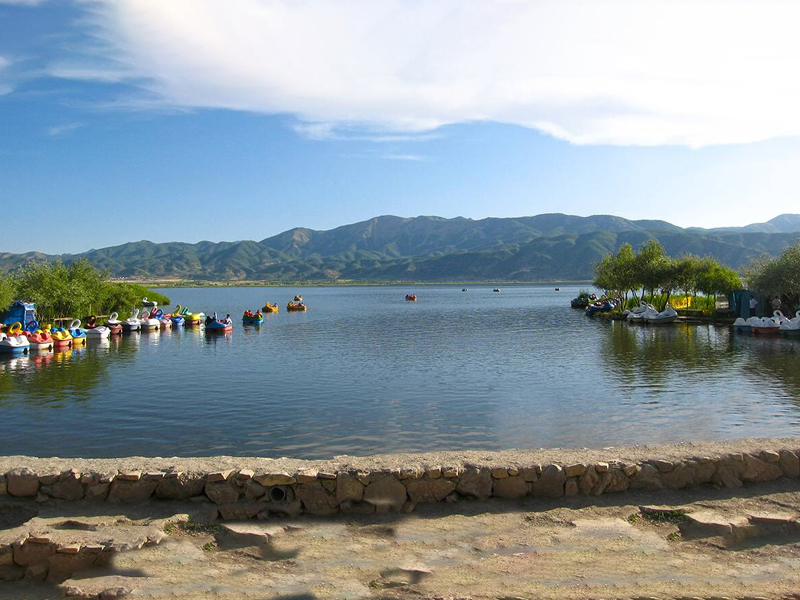
It is interesting to know that Zaribar Marsh is under complete environmental protection and is considered one of the wildlife sanctuaries in Ira. The Zarivar Lake area is exceptionally rare and unique in terms of its aquatic ecosystem and biodiversity, which is why it hosts specific wildlife and plant species. In the following, we will introduce some of the animal and plant species in and around Zarivar Lake.
Birds in Zarivar Lake!
We mentioned that the Zarivar Lake area hosts various rare and unique animals and birds. Both aquatic and non-aquatic birds are not an exception to this rule. Due to the favorable climate in the ecosystem of this lake, different native and migratory bird species live here. It is estimated that 31 species of native and migratory birds currently live in this marsh and its surroundings. Birds such as flamingos, Eurasian teal, grey herons, great white pelicans, storks, and mallards are among these species. Other rare species such as the avocet and the black-winged stilt also live in this region. Every year, many photographers visit this marsh to capture photos of these rare birds.
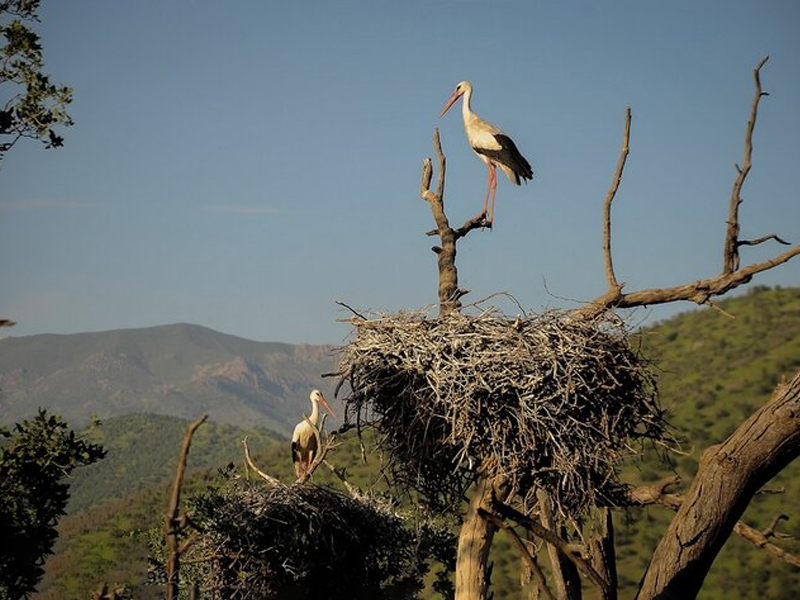
Aquatic Animals and Fish
Zarivar Lake is one of the rich sources of various aquatic animals and fish in the region. Different native and non-native species of fish live in this large marsh. Species such as mirror carp, black carp, common carp, gambusia, white amur, silver carp, common bream, and many others can be found in this lake. It is also worth mentioning that several extremely rare species have been identified in this lake, including 17 species of zooplankton, 5 species of phytoplankton, and one species of mudfish.
Mammals and Reptiles
In addition to birds and aquatic animals, Zarivar Lake and its surrounding areas are habitats for various mammal and reptile species. Some notable mammals that live in this area include otters, hares, brown bears, wild boars, foxes, and wild pigs. Among the reptiles in this lake, we can mention the Caspian whipsnake, leopard snake, Aesculapian snake, grass snake, and European four-lined rat snake, all of which are non-venomous. The venomous Kurdish viper and Persian horned viper also live in this region. Turtles and various species of lizards, agamas, and geckos are among the other reptiles in Zarivar Lake.
Amazing Plant Cover
The wonders of Zarivar Lake and its unique ecosystem do not stop at rare and special animal species. This area also harbors rare plant species. In the forests surrounding the lake, you can find oak trees, wild pear trees, almond trees, and dogberry trees. But you might be curious about the vegetation cover of the marsh itself. Species such as Ceratophyllum and Ceratophyllum demersum, which are floating plants, are among them. Additionally, thorny plants, reeds, water lilies, watercress, water primroses, water buttercups, sevenleaf, pennyroyal, juncus, and many others are part of the plant cover in Zarivar Lake.
Mysterious Stories of Zarivar Lake!
Usually, places that have both a historical background and rich natural attractions also have legends. Join us at Eligasht to learn more about the mysterious stories of Zarivar Lake.
The Dervish and the Tyrannical Ruler
One of the stories that locals tell about this freshwater marsh is the tale of the dervish and the tyrannical ruler. According to this narrative, there used to be a city instead of Zarivar Lake, ruled by a very tyrannical ruler. A dervish, accompanied by his wife riding on a donkey, passes by this city, and the ruler’s guards arrest him. The ruler and his men torment the dervish, his wife, and the pregnant woman. The dervish goes to seek justice from the ruler, but the ruler orders him to be expelled.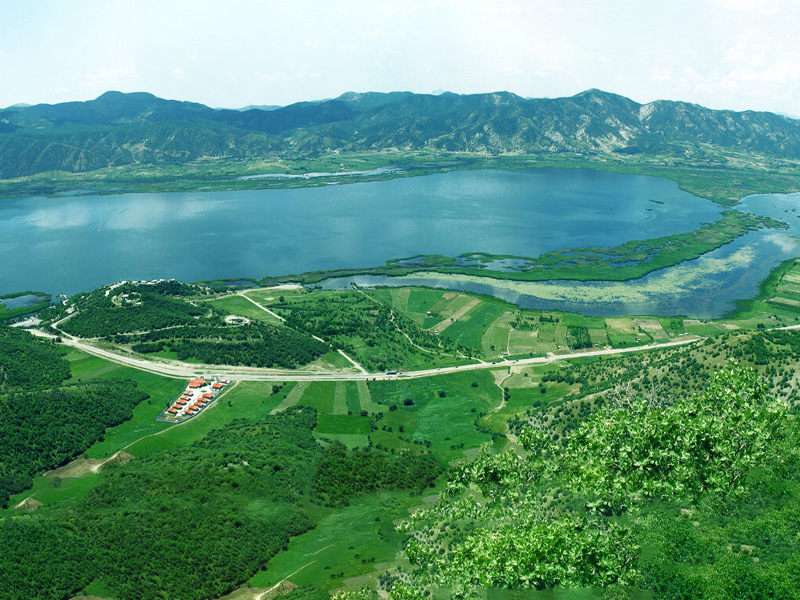
After that, the dervish goes up a nearby mountain and curses the tyrannical ruler and his oppressive people. He prays to God to turn the city into water so that its inhabitants receive what they deserve. God doesn’t disappoint and answers the dervish’s prayer. The city turns into water, and Zarivar Lake emerges in its place. That’s why this lake is also called “Dadkhah Lake” (Lake of Justice) because it was created to seek justice.
According to legends, the dervish’s tomb is located at the foot of the mountain. Thus, his spirit still watches over Zarivar Lake.
The Treasure of Zarivar Lake!
Another intriguing story that is on everyone’s lips about Zarivar Lake is the treasure of the lake. According to some local legends, a treasure was hidden beneath the lake’s surface many years ago. No one knows the nature of this treasure, but some believe that the lake protects it. So far, no one has succeeded in finding the treasure! Some people believe that the reason the lake is named “Zarivar” (Golden Water) is because it refers to the gold treasure.
Visiting Zarivar Lake
Perhaps after reading about the wonders of this region in Kurdistan province, you might be inspired to visit Zarivar Lake. As mentioned, this lake is one of the important tourist attractions in Kurdistan province. Every year, a large number of Iranian and foreign tourists visit this magnificent marsh.
You might want to know the best times of the year to visit the lake. Due to the cold weather at Zarivar Lake in winter, we recommend visiting in spring and summer. During these seasons, the weather around the marsh is mild, and the scenery is extraordinary. However, in winter, you’ll be greeted with a frozen lake and a unique view, and if you don’t mind the cold, we also recommend visiting the lake during this season.
To visit Zarivar Lake after traveling to Kurdistan, you can take one of the roads from Marivan to Paveh, Marivan to Sanandaj, Marivan to Baneh, Marivan to Kamiaran, or Marivan to Saqqez.
Recreational Facilities
The main recreational activities at Zarivar Lake include fishing, boating, and water skiing. Fishing is allowed in the lake from the beginning of September until the end of December. Outside of this period, fishing is prohibited. Additionally, during the winter season, you can enjoy skiing and ice skating on the frozen lake. It’s interesting to note that there is a paragliding site within the vicinity of Zarivar Lake. With this opportunity, you can fly over the lake with a paraglider and experience an exceptional view.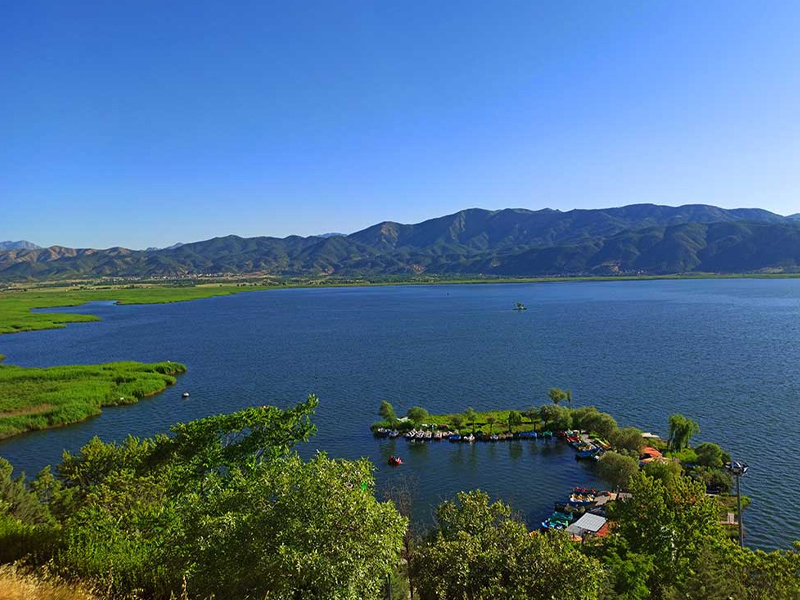
If you love bird watching and photography, don’t miss the chance to visit and capture images of various birds at Zarivar Lake! Furthermore, if you’re fond of eating grilled fish, we recommend visiting the restaurants around Zarivar Lake, where you can taste grilled fish like nowhere else in the world! There are also various hotels and accommodations in the area where you can stay. The surrounding villages of Zarivar Lake, such as Yengije, Bardeh Rasheh, Kani Sepik, Pirsafa, and Darre-Tafti, are also very beautiful and worth visiting.
Preserving the Beauty of Zarivar
As visitors flock to Zarivar to witness its beauty, it is crucial to ensure the preservation of this natural wonder. Here are some tips for responsible tourism:
- Respect the Environment: When visiting Zarivar, be mindful of your impact on the environment. Avoid littering, pick up after yourself, and leave no trace of your visit. Help keep the lake and its surroundings clean and pristine for future generations to enjoy.
- Support Local Communities: Engage with the local Kurdish communities and support their sustainable tourism initiatives. Purchase locally made crafts and products, dine at local restaurants, and learn about the rich culture and traditions of the region.
- Follow Regulations: Observe any rules and regulations set by the authorities to protect the lake and its ecosystem. These may include restrictions on fishing, boating, or camping in certain areas. By respecting these guidelines, you contribute to the preservation of Zarivar’s natural beauty.
Final words
Zarivar Lake, known as the turquoise gem of Kurdistan, is one of the most important tourist destinations in the region. Zaribar freshwater marsh is one of the largest freshwater marshes in the country, and even in the world. This lake is located near the city of Marivan and has a long history. this Lake is listed as a natural heritage site in Iran and is under environmental protection. Zaribar Marsh is recognized as a wildlife sanctuary and hosts a diverse range of plant and animal species. Every year, a large number of tourists visit this turquoise gem. The recreational facilities at Lake include fishing, boating, skiing, and paragliding. If you are a nature lover, don’t miss the amazing experience of visiting Zarivar Lake!
Related post
Tourist Attractions of Kurdistan: a hidden Gem inside Iran
Hawraman Kurdistan is registered as a UNESCO World Heritage Site
FAQ
1- How big is Zarivar Lake?
this Lake covers an area of approximately 5 square kilometers (1.9 square miles). It is a relatively small lake compared to some others in Iran, but its scenic surroundings and tranquil atmosphere make it a popular tourist destination.
2- What activities can visitors enjoy at Lake?
Visitors to this Lake can engage in various activities such as boating, kayaking, and fishing. The calm waters of the lake provide an excellent opportunity for relaxation and enjoying the picturesque landscape. There are also picnic areas and walking trails around the lake for those who prefer a stroll.
3- Are there any accommodations near Zarivar Lake?
Yes, there are accommodations available near Lake to enhance visitors’ experience. In the vicinity of the lake, you can find hotels, guesthouses, and camping sites that cater to different preferences and budgets. Staying overnight allows visitors to fully enjoy the tranquility of the lake and its surrounding natural beauty.
4- Is fishing allowed in Zarivar Lake throughout the year?
No, fishing is only permitted in this Lake from the beginning of September until the end of December. It is prohibited outside of this period.
5- Is Zarivar Lake a protected area?
Yes,this Lake is listed as a natural heritage site in Iran and is under environmental protection. It is recognized as a wildlife sanctuary and home to diverse plant and animal species.
